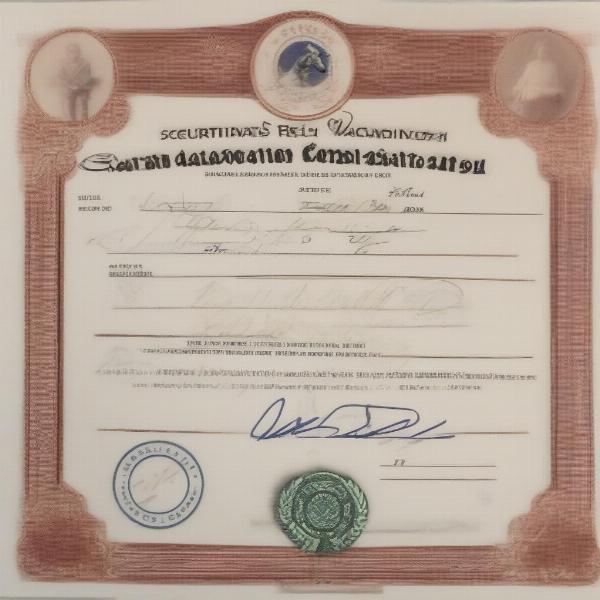Fake dog shot records are a serious issue that can have far-reaching consequences for both individual dogs and public health. Understanding why these falsified documents are problematic and how to ensure your dog has legitimate vaccination records is essential for responsible pet ownership. This article will explore the dangers of fake dog shot records, explain how to identify them, and guide you in obtaining accurate documentation for your furry friend.
The Dangers of Falsified Vaccination Records
Falsified vaccination records put dogs at risk of contracting preventable diseases like parvovirus, distemper, and rabies. These illnesses can be severe, even fatal, especially for puppies and senior dogs. Beyond the individual dog, fake records contribute to the spread of these diseases within the canine population. Outbreaks can occur, impacting not only pets but potentially posing a threat to human health in the case of zoonotic diseases like rabies. Furthermore, using fake records can have legal ramifications, potentially resulting in fines or other penalties.
How to Identify Fake Dog Shot Records
Identifying a fake vaccination record can be challenging, but there are some key indicators to look out for.  Spotting Fake Dog Vaccination Certificates: Key indicators to look out for Discrepancies in formatting, inconsistent font usage, or missing clinic information are red flags. Check the veterinarian’s signature and contact information—a legitimate record will have clear, verifiable details. If anything seems suspicious, contact the listed veterinary clinic to confirm the record’s authenticity.
Spotting Fake Dog Vaccination Certificates: Key indicators to look out for Discrepancies in formatting, inconsistent font usage, or missing clinic information are red flags. Check the veterinarian’s signature and contact information—a legitimate record will have clear, verifiable details. If anything seems suspicious, contact the listed veterinary clinic to confirm the record’s authenticity.
Obtaining Legitimate Vaccination Records
Ensuring your dog has accurate vaccination records starts with regular visits to a licensed veterinarian. Discuss an appropriate vaccination schedule based on your dog’s age, breed, lifestyle, and local disease prevalence. Maintain all original documentation provided by your veterinarian, and keep digital copies for backup. If you’ve adopted a dog and are unsure of its vaccination history, consult with your veterinarian. They may recommend titer testing to determine immunity levels and develop a suitable vaccination plan.
Why are people searching for “fake dog shot records”?
- Avoiding Vaccination Costs: Some individuals may seek fake records to bypass the expense of vaccinations.
- Convenience: Obtaining fake records may seem easier than scheduling veterinary appointments.
- Travel Requirements: Fake records might be used to circumvent pet travel regulations.
- Breeder Misconduct: Unethical breeders may falsify records to sell puppies quickly.
What to do if you suspect your dog has fake records?
Immediately consult your veterinarian. They can assess your dog’s health, recommend necessary vaccinations, and help you obtain legitimate documentation.
Conclusion
Fake dog shot records are a significant risk to canine and public health. By understanding the dangers, learning how to identify falsified documents, and prioritizing accurate record-keeping, responsible pet owners can contribute to a safer and healthier environment for all dogs. Don’t compromise your dog’s well-being—ensure they receive proper veterinary care and have legitimate vaccination records.
FAQ
- What are the legal consequences of using fake dog shot records? Penalties vary by jurisdiction, but fines and other legal actions are possible.
- How can I report someone selling fake dog shot records? Contact your local animal control or veterinary authorities.
- Are digital vaccination records acceptable? Yes, many veterinarians provide digital copies, but always keep originals or printed backups.
- My dog lost its vaccination tag, what should I do? Contact your veterinarian for a replacement tag and updated records.
- Can I vaccinate my dog myself? No, vaccinations should only be administered by a licensed veterinarian.
- How often should my dog receive booster shots? Consult your veterinarian for a personalized vaccination schedule.
- Are there any risks associated with vaccinating my dog? While rare, some dogs may experience mild side effects like lethargy or soreness. Discuss any concerns with your veterinarian.
ILM Dog is a leading international pet website dedicated to providing expert advice and resources for dog owners worldwide. We offer comprehensive information on dog breeds, health, training, nutrition, grooming, and much more. From puppy care to senior dog support, we’re here to help you every step of the way. Our expert articles are tailored to meet the needs of both new and experienced dog owners, offering practical tips and insights to ensure the well-being of your furry companion. For expert advice on all aspects of dog care, contact ILM Dog today. Email: [email protected], Phone: +44 20-3965-8624. Visit us at ILM Dog for more valuable resources.